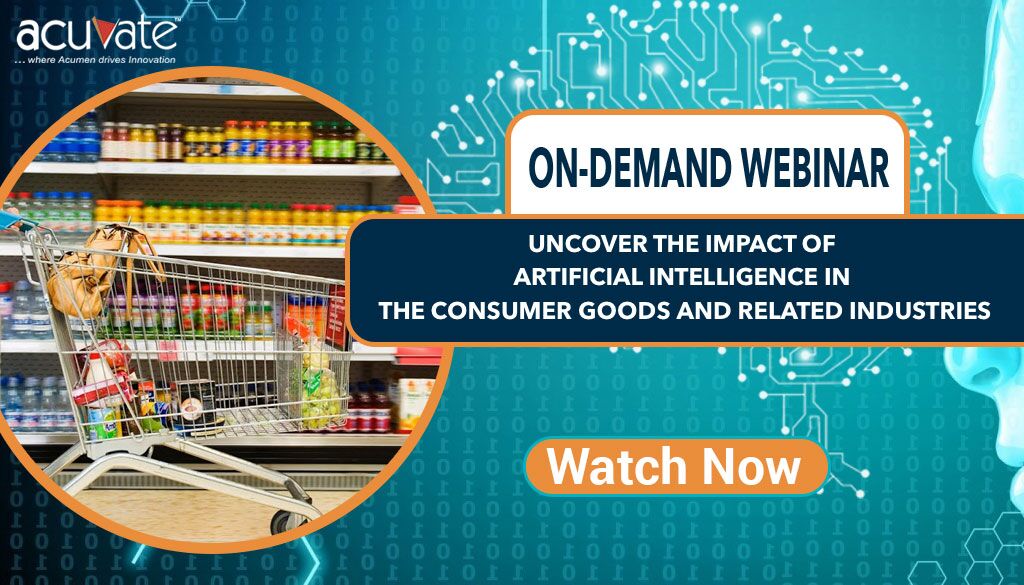Artificial Intelligence is the hottest buzzword in the tech industry. There have been a lot of predictions and speculations on how AI is going to take the world by storm.
As someone who empowers enterprises with AI powered assistants, we asked 22 Artificial Intelligence experts the following question:
What is your prediction on how AI will impact the enterprise workplace?
Here’s what they said…
A quick note: The opinions of all the experts are their own. Acuvate doesn’t share or have any comment on any of their views/opinions.
#1 AI systems will not only study or draw up contracts but even enforce them, via blockchain.
Near-term predictions are strong but unsurprising. Many jobs in clerical and white collar management — even lawyers — will find their most routine and systematic tasks taken over.

Well-paid radiologists are already facing the fact that Watson-systems can parse images quicker and have a lower error rate.
AI systems will not only study or draw up contracts but even enforce them, via blockchain.
But the biggest near term shock will hit by surprise. I call it the ‘first robotic empathy crisis’. Within three to five years we will have entities either in the physical world or online who demand human empathy, who claim to be fully intelligent and claim to be enslaved beings, enslaved artificial intelligences, and who sob and demand their rights.
This will happen before AI researchers say there’s “anything under the hood.” Years before there’s actual, confirmed consciousness in an AI system. It will happen because innovators in Japan and at Disney want it to happen!
Of course then you get the intermediate and long term. And in each of those time realms, there will be some big AI surprises, only a few of which I’ve been able to discuss in papers or in novels.
David Brin , Scientist, Futurist & Astrophysicist.
David is an astrophysicist whose international best-selling novels include The Postman, Earth, and recently Existence. Dr. Brin serves on advisory boards (e.g. NASA’s Innovative and Advanced Concepts program or NIAC) and speaks or consults on a wide range of topics. His nonfiction book about the information age – The Transparent Society – won the Freedom of Speech Award of the American Library Association.
#2 It is important that a company is organised around a core skeleton of directly connected human workers

My key recommendation wrt AI in the workplace: it is important that a company is organised around a core skeleton of directly connected human workers, so that insights and opportunities can be passed between empathic humans, even from the customer to the chief executive if necessary, though in all likelihood empowered individuals will be able to solve many problems.
But disintermediation through technology leads to brittleness and makes it impossible to capture both problems and opportunities that may arise that are outside the expected business process.
Dr. Joanna J. Bryson, Reader at University of Bath, and Affiliate, Center for Information Technology Policy at Princeton University. Popular Researcher of Artificial and Natural Intelligence.
#3 Long term AI will replace human participants in the enterprise workplace.

Dr. Roman V. Yampolskiy, is a professor of Computer Science and engineering. He is a AI Safety & Cybersecurity researcher and the author of “Artificial Superintelligence: A Futuristic Approach.” Dr. Yampolskiy’s research has been featured 250+ times in numerous media reports in 22 languages. He is also featured in IBM’s Top 30 AI influencers for 2017 list.
#4 Our expectations will shift dramatically as our relationships to work, to AI, to co-workers, to management, and to the meaning of work itself is forever altered.
It would be far easier to answer how Artificial Intelligence, (AI), will not impact the enterprise workplace than the myriad layers impacting work. As we look at AI in the context of the enterprise workplace it’s a mistake and a grave oversimplification for us to compartmentalize automation, workforce, etc.
Make Data Actionable with AI!
Global CPG Organizations aucceed with Acuvate’s AI-Powered Business Intelligence Services
Let us not lose sight of something quite fundamental that undoubtedly is already changing – human interaction, and connection. We forget to recognize how interdependent we are upon one another, and imagine the shift in culture as we become ever more increasingly interdependent upon machines. Who of you reading this is without a Smart phone? Our hands are already in Pandora’s Box, and there is no going back. We’ve all swallowed the Red Pill.
Artificial Intelligence has already been woven into the very fabric of our human existence and our relationships and the way in which we relate will be impacted most. We will rethink our roles, who we think we are, and what we believe we contribute that is meaningful and real.
Our expectations will shift dramatically as our relationships to work, to AI, to co-workers, to management, and to the meaning of work itself is forever altered. AI is the most popular word du jour, pregnant with hype, and hope. However, there is one thing I am absolutely sure of, we don’t know what we don’t know. We must remain ever vigilant, and conscious of our creations.
Just because we can doesn’t mean we should. We must think beyond innovation to impact. I believe wisdom speaks deeply through the words of American AI researcher and writer, Eliezer Yudkowsky, “By far, the greatest danger of Artificial Intelligence is that people conclude too early that they understand it.”
Tamara McCleary is the CEO of Thulium, an agency specializing in B2B and Enterprise marketing. She is ranked as a Top 10 AI Influencer by Onalytica in 2017.
Tamara is an internationally recognized keynote speaker, thought leader, marketing/digital strategy consultant in new technologies. She is ranked by Klout, Kred and Klear in the Top 1% of global Social Media Influencers. Onalytica has also ranked Tamara a Top 50 Blockchain, Top 50 Digital Transformation, Top 5 Robotics, Top 15 Martech, Top 10 Augmented Reality, Top 10 AI, Top 10 Big Data and Top 5 IoT Influencer in 2017. Tamara is an IBM Futurist and is ranked by LeadTail in 2017 as the 2nd most mentioned person on Twitter by CMOs and 13th most mentioned by CIOs. In addition, in 2016 Tamara was named the Most Influential Woman in Martech by B2B Marketing.
#5 AI will give rise to enterprise personal assistants with more robust utility – both in our work and personal lives

AI experts see health, legal, education and even AI research as the best early fits for workplace assistants. AI assistants will provide guidance in personal decision-making and, later, even physical support in the factory workplace.
Evan Kirstel, an internationally recognized thought leader and social media influencer in IoT (#1 in 2017), Cloud, Data Security (2016), Health Tech (#9 in 2017), Digital Health (#6 in 2016), B2B Marketing (#5 in 2015), AI, Smart Home, Digital (2017), IIoT (#1 in 2017), Telecom/Wireless/5G. He is the top 10 most mentioned/re-tweeted by CMOs and CIOs (2016).
#6 AI will make work a primarily creative and strategic endeavor.
Artificial intelligence will ultimately transform the way we work like no other set of technologies before it.

However, in the short term it will largely aid the workforce by more easily automating rote tasks, being the unblinking eye that studies our endless streams of analytics for us, and helping us spend more time doing what matters most, strategic knowledge work.
Longer term, it will remake how we manage and lead our organizations, as cognitive technologies – combined with pervasive data from all our systems and devices — allow more rigorous and effective decision making, corporate oversight, and performance management than ever before possible.
Ultimately, AI will make work a primarily creative and strategic endeavor.
Dion Hinchcliffe – VP and Principal Analyst, Constellation Research | Digital Thought Leader, CXO Advisor, Professional Speaker, Book Author, ZDNet Commentator, and Industry Analyst.
#7 AI applications will discover more efficient ways of doing complex processes.
AI is a very short acronym that carries a lot of hype, holds a lot of promise, and delivers a very huge impact. In short, AI is the application of machine learning algorithms that take data (input signals) from insights to actions. Ideally, there is a human in the loop to validate the efficacy and safety of those actions.

Hence, AI is more than artificial intelligence, it is also augmented intelligence.
AI applications will impact business from the back office to the front office. (They will)
- Deliver improved employee experience and customer experience.
- Automate redundant processes and will discover more efficient ways of doing complex processes.
Since the world is now digital, there is almost nothing in the modern organization that cannot learn from, benefit from, and deliver value from AI.
Kirk Borne, Principal Data Scientist and Executive Advisor at Booz Allen Hamilton, PhD Astrophysicist.
#8 Jobs That Are Routine Will Have a High Probability Of Being Automated By AI.

We are at the start of the Artificial Intelligence (AI) revolution. Just like the Internet and mobile, AI will profoundly change we work and how society operates. We are still at the early stage of this revolution. Workers who are focused on innovation will have secure jobs. But jobs that are routine will have a high probability of being automated by AI.
Jim Harris, International Bestselling Author on Disruptive Innovation
#9 There will be a significant rise of virtual assistants, drones, artificial intelligence bots, and virtual tellers within the next two years
In the wake of the ASIC-based Tensor Flow chips manufactured by Google, corporations are building AI bot platforms powered by Tensor Flow, Python, Kubernetes, and C++ to power enterprise workplace by improving or delivering customer service.

The research data (‘Digital Workplace Report: Transforming Your Business’ published by Dimension Data in July 2017) from 800 organizations in 15 countries shows that there will be a significant rise of virtual assistants, drones, artificial intelligence bots, & virtual tellers within the next two years powered by IoT platforms and big data driving new mobile, digital, smart services driven economy on AI engines delivering banking services, retailer services, and customer services.
Dr. Ganapathi Pulipaka is the CEO and Chief Data Scientist at DeepSingularity LLC and a top #3 Machine Learning influencer on Twitter for 2017 (KCore Analytics).
He is a Postdoc research scholar in Computer Science Engineering, Machine Learning, Big Data Analytics, and Artificial Intelligence who also holds a Professional PhD in Information Systems and Enterprise Resource Management. His areas of expertise include Machine Learning, Deep Learning, IoT, and Analytics in TensorFlow, Python, and R Languages with extensive experience in SAP systems such as SAP ERP, HANA, CRM, SRM, SCM, PLM, PPM, and BW NetWeaver products. Ganapathi Pulipaka is an SAP Certified Professional and author of the book “Big Data Appliances for In-Memory Computing.”
#10 AI will have a continued and growing impact on understanding how to improve customer loyalty, an important organizational outcome.

In the customer experience/success space, we already are seeing these efforts helping to build shopping assistants (chatbots), improve operational efficiencies, identify at-risk customers (behavioral analytics), and detect fraud / prevent security breaches (anomaly detection) to name a few.
Consider all the systems that house customer data, including Salesforce, Google Analytics, Mixpanel and Marketo that are commonplace in business today. The tools and methods of AI (e.g., NLP, machine learning, deep learning) can find the connections/associations across all these data sources to help enterprises better understand and manage customers.
Since 2012, the investments in AI startups have increased; AI startups received a record-setting $5 billion in venture-capital funding in 2016, according to CB Insights. IDC projects that worldwide revenues from cognitive systems and AI will reach $47 billion by 2020.
I believe that wherever there are data that describe processes, AI can have a beneficial impact and its importance will only grow. This sentiment is especially true for the enterprise where we have quantified nearly every aspect of underlying business processes.
Bob E. Hayes, PhD is a scientist, blogger and author (TCE: Total Customer Experience, Beyond the Ultimate Question and Measuring Customer Satisfaction and Loyalty).
He conducts research in the area of big data, data science, customer feedback (e.g., identify best practices in CX/Customer Success programs, reporting methods and loyalty measurement) and helps companies improve how they use their customer data through proper integration and analysis.
#11 It is wise not to try to compete with AI but embrace its obvious advantages in the workplace.

AI and machine learning will change the status quo for all industries. The enterprise workplace will become very competitive and new skills will be needed. It is wise not to try to compete with AI but embrace its obvious advantages in the workplace.
Spiros Margaris is a Venture Capitalist & Thought Leader in the FinTech & Insurtech scene. He was ranked #1 FinTech & #2 Insurtech global influencer by Onalytica and regularly appears in the top three positions in several industry rankings.
Previously, he worked in banking and money management (hedge funds) and launched two start-ups in New York, one of which would nowadays be termed a fintech. He is a frequent speaker at international fintech and insurtech conferences and publishes articles on his innovation proposals and thought leadership.
#12 AI presents enterprise with myriad opportunities to streamline and strengthen business operations, both internally and externally.

Tapping into rich, actionable data, AI will personalize and “humanize” automation.
Enterprise leaders must become quick studies in AI, onboarding the talent needed to understand and seize the opportunities created by AI, while also being mindful of its risks.
As AI is optimized by creativity in the workplace, it should also be governed by processes that guard against inappropriate biases that may work their way into AI-guided operations.
AI governance – proactively reviewing AI operations from a compliance perspective, should be institutionalized to help minimize risks that might otherwise go unnoticed.
Glen Gilmore – Called a “man of action” by TIME magazine, Gilmore is a Forbes Top 20 “Social Media Influencer” who is ranked a top thought leader in Content Marketing, IoT, AI, Augmented Reality & Travel.
He is called a “futurist” by IBM, Gilmore is an international speaker who provides Digital Marketing strategy and training to the Fortune 500.
#13 AI will become part of everyday lives, making our work easier and better.

AI will have a significant impact on organisations and as such the workplace. Already, we see conversational AI, also known as chatbots, taking over many jobs in for example call centres.
What we will see in the coming years is that AI will become our boss, our copywriter, our assistant, our driver and the customer service.
AI will become part of everyday lives, making our work easier and better. It is a fascinating time to be around and experience how AI will change the enterprise workplace for the better.
Mark van Rijmenam , Founder of Datafloq, Author/Speaker, Global Big Data, Blockchain and AI influencer.
#14 Customers expect real time service, which is impossible to achieve without AI

The biggest impact of AI will be seen in the field of customer service and experience. There is a lot of data available in the field of customer service, and this is the key ingredient for AI projects.
Next to that, customers expect real time service, which is impossible to achieve without AI.
Humans in customer service will not be replaced by this evolution, their intelligence will get augmented. Because of that, their work will become more relevant and their productivity will go up.
Steven Van Belleghem, Keynote speaker & inspirator on customer centricity in a digital world. Author of When Digital becomes Human, co-founder of Nexxworks and Snackbytes. You can check out his Youtube channel for videos on customer-centricity in a digital world.
#15 The use of Artificial Intelligence is one of the most effective ways to create a strong collaborative workplace

Obviously, collaboration is one of the major success key for any organization.
Companies have to interact effectively with internal and external parties (for best insights, decision-making). And the use of Artificial Intelligence is one of the most effective ways to create a strong collaborative workplace (from marketing to sales to customer service).
So, the future of workplaces will be defined by collaborative teams where employees as well as executives will have cross-functional skills (especially data analysis skills) and will commonly work in tandem with intelligent machines.
Pierre Pinna, CEO at IPFC Online.
#16 My main prediction is the widespread acceptance of AI; providing an almost 100% autonomous environment inside enterprise brands.

AI has already massively impacted enterprise brands in many areas from content to conversion, right through to operations and R&D.
“A Fortune 50 Healthcare brand utilized AI-powered search into their research and development efforts. The result? Research time was slashed by ~160 hours — A productivity increase that equaled a $1.75 million reduction in resource costs.”
With case studies and stats like this, it’s inevitable that the need for human input will continue to rapidly decline in the near future.
While this is not-so-great news for employment, it’s amazing technological progress for enterprise brands looking to scale even further.
The sheer power of AI means vastly improved efficiency with seemingly no upper-limits to potential application.
Measure & Optimize Your Trade Promotions Effectively
Compass: An AI-Powered Trade Promotions Optimization Solution
That said: My main prediction is the widespread acceptance of AI; providing an almost 100% autonomous environment inside enterprise brands.
Sam Hurley is a lateral-thinking digital marketer holding solid experience in both agency and client-side settings. He is Founder of the eagerly-anticipated: OPTIM-EYEZ platform.
Sam has achieved success for SMEs and popular global brands through to blue chip organizations while being ranked as the world’s #1 digital influencer by Webinale and #2 most influential digital marketer by Onalytica. He was also commended as one of the top 3 content marketing influencers by ScribbleLive.
#17 Employees who use AI driven systems receive better information

AI is already impacting the workplace in two ways. Employees who use AI driven systems receive better information, allowing them to take quicker and more precise action. Additionally, new jobs will be created with requirements of knowledge workers to organize data for input into AI systems and interpreting the output for better decision making.
Bernie Borges, CMO of Vengreso, Host of the Social Business Engine Podcast
#18 Businesses will recognize and eliminate tedious processes that can be automated with Artificial Intelligence.

Enterprises are already realizing the need to empower employees with various AI applications, which include chatbots.
Businesses are now actively identifying processes that can be automated with AI.
In the near future, we expect to see several small and large businesses deploy AI bots, which will learn and understand office jargon, automate manual and time-taking tasks and provide important data to the right people at the right time.
These bots will play the role of a digital team member/colleague in different organizational teams and drastically boost employee collaboration, efficiency and work productivity.
Jagan Jami, COO at Acuvate Software
#19 AI is similar to where social media was 8 years ago

AI is similar to where social media was 8 years ago. It is a trendy buzz term so you see “gurus” pouring into the market, offering random acts of AI. Many of these projects will be under the radar of IT departments and probably boards of companies.
The majority will probably fail, as did many of the early the social media projects, it is not until companies see AI as a strategic imperative where the board (C-Level) understand back it’s use with a defined strategy that a definitive ROI and business benefit will be found.
Timothy Hughes, Co-Founder – Digital Leadership Associates, Speaker, Innovator & Best Selling Author: Social Selling – Influencing Buyers and Changemakers.
#20 The “A” disappears in front of the “I”, making the concept of artificial intelligence irrelevant and obsolete.

Jarno M. Koponen – A designer and humanist. Interested in combining human-centered design and adaptive technologies to create experiences that empower our creativity and well-being. Featured in TechCrunch, Mashable, Vice Motherboard among many other reputed publications.
The “A” disappears in front of the “I”, making the concept of artificial intelligence irrelevant and obsolete.
#21 I think many companies’ systems will be AI systems and make work easier and work environment more pleasant in future.
Many applications will be easier to use and help employees systematize their work processes. Artificial intelligence (AI) and deep learning are designed to learn from experiences which make them more efficient and user friendly.

Companies can easily analyze their data and improve their bottom line and sales. Today the majority of companies’ data analytics are not user friendly and there are a lot of glitches within these systems.
Many bigger companies still use outdated data in their intranet system. Why? Because they think it is cheaper and they can save money. Do they do the right thing? No. They spend more time on each work process. Employees are frustrated by system errors, down time and server errors. Internal phone systems are not functioning properly.
You expect such a big company have modern data tools, but many of them lack of having the right tools for work. Many enterprise companies lack the right chair and tables for their employees, which increases the rate of employee absence. They get backache and muscle aches because of sitting hours on non ergonomic chairs.
These are hurting a company’s bottom line. Their statistics tools give faulty results which confuses companies. This is why many companies make wrong decisions. Because their data analytics are not 100% accurate so they make decision based on the given data.
This is why many companies go bankrupt. In future A.I will be implemented in many of these tools which make them more accurate and as a result companies will be able to improve their finances and budget problems.
When it comes to recruiting processes, based on given data to an AI recruiting system, it will fetch the right expert for the right job, however at the end a human HR’s decision-making will make the final decision. Currently 99% of recruiting application systems is done by software which gives the wrong result. They can’t hire the right candidate. This is why we see the same job application all over again. Artificial intelligence makes this decision making process easier in future. I think many companies’ systems will be AI systems and makes
work easier and work environment more pleasant in future.
Maria Johnsen, Global Digital Marketing and AI Influencer, Environmentalist, Investor, Philanthropist and Author.
#22 Adoption of AI into enterprise operations can (and will) impact every part of an organization

The enterprise focused on growth and profitability has no option but to embrace technology and make a commitment to digital transformation. This very much includes understanding the benefits artificial intelligence affords and making a commitment to adoption of AI.
Whether it’s the ability to more quickly identify and acquire customers, the ability to better understand and serve existing customers, or using AI to streamline operations and increase operating efficiencies, and a host of other things, AI presents a myriad of opportunities for the intrepid, customer-centric, employee-centric enterprise—which is the business model for success today.
The adoption of AI into enterprise operations can (and will) impact every part of an organization, including R&D and a company’s ability to innovate, sales operations, customer service, marketing, customer experience, IT, and last but never least, HR.
HR is a critical part of the equation as it relates to the adoption of AI, as success with regard to any deployment of AI into business operations will be continent on a company’s ability to attract, train, and retain employees with creative and analytical thinking skills.
That doesn’t mean that all members of an organization need to be data scientists or analysts, but instead, that there needs to be an understanding of the importance those with technical skills bring, a dedicated effort to attract top technical talent, as well as a commitment throughout the organization as a whole to ongoing training, process development, organizational development, and a culture committed to innovation and change.
A culture fueled by data, the adoption of AI, and a commitment to staffing at all levels that results in a culture that is attractive, innovative, ever-growing, customer-focused, and effective, is the recipe for the successful enterprise of today.
Shelly Kramer, CEO of V3 Broadsuite and President of Broadsuite Media Group
A serial entrepreneur, business strategist, speaker, and data geek, Shelly focuses on helping clients embrace digital transformation, leverage technology, embrace innovation, create spectacular customer experiences, generate leads, all the while putting the people part of the equation and corporate culture front and center. Shelly is the Founder and CEO of V3B Broadsuite, a marketing consultancy, and president of Broadsuite Media Group. Our primary business is focused on providing demand generation, lead generation, and business growth strategies and services, backed by the power of a media company.
How Acuvate Empowers Enterprises With Artificial Intelligence.
Acuvate helps various Fortune 500 companies, SMBs, start-ups, agencies etc., in creating, developing, deploying and managing AI chatbots to improve productivity, efficiency and coordination at workplaces.
Our Solutions In This Space Include:
- BotCore: An enterprise bot builder platform and tool set using which enterprises can train and deploy chatbots for their organization.
- MeshBot: World’s premier chatbot for Sharepoint intranet that can solve your intranet adoption challenges.
- IT Helpdesk Bot: IT Helpdesk Bot uses machine learning to learn answers to repetitive support requests and improves the speed and work productivity of your helpdesk.
- SIA Bot: An intelligent sales assistant which helps your sales team in making informed decisions and improve top line revenue.
Learn more about our enterprise-ready AI chatbots.
If you’d like to learn more about this topic, please feel free to get in touch with one of our AI and digital workplace consultants for a personalized consultation.
